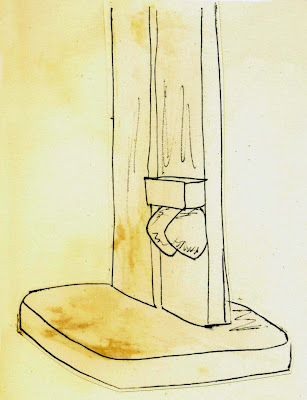Central
pillar of Saora house, Peddakimedi Maliaks, Orissa (also written
Sora, they are an Adivasi - aboriginal - people of eastern India). It
is a patrilineal culture whose marriage ceremony emphasizes the woman
leaving her own kin, but the groom places offerings before the
breasts of this ancestral woman-pillar. But they have free choice in
marriage, and looser gender roles than the dominant culture. Also,
most of the shamans are women, especially the funerary kuran, while
the diviner-healers can be any gender. Entranced kuran hold dialogues
with the dead on a daily basis. The dead become sonum, "spirit,
deity, power," sometimes translated also as "memory".
All this from Melinda Makai, "Shamanism Among the Soras"
(2008), who writes, "The most important shamans are women: they
also marry a sonum from the kshatriya caste of the Hindus (ilda) in
the Underworld..." This spirit husband was once a living shaman,
often related to the woman. This pattern of spirit marriage is common
for both male and female shamans in many cultures.
